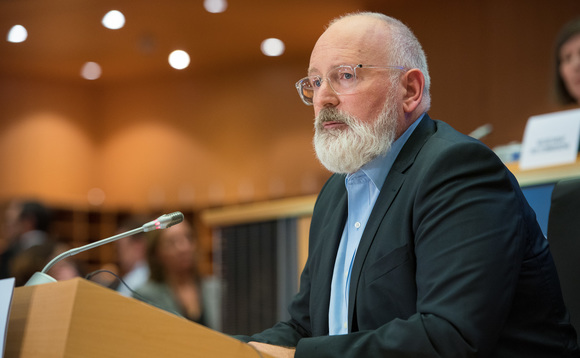

The European Commission yesterday unveiled its long-awaited hydrogen strategy, outlining its vision to ramp up the EU's renewable hydrogen capacity from 1GW today to 6GW by 2024 and 40GW by 2030.
The Commission said its priority would be to develop green hydrogen, produced by electrolysers powered by renewable energy. However, in a move that sparked criticism from some green groups the Commission confirmed it would also support blue hydrogen, produced using fossil fuels at plants that could be linked to carbon capture and storage (CCS) systems in the short and medium term.
Frans Timmermans, executive vice-president for the Green Deal, said the plan would "bolster the European Green Deal and the green recovery" while allowing the bloc to decarbonise by mid-century.
"The new hydrogen economy can be a growth engine to help overcome the economic damage caused by Covid-19," he said. "In developing and deploying a clean hydrogen value chain, Europe will become a global frontrunner and retain its leadership in clean tech."
Hydrogen is widely seen as playing a key role in decarbonising hard-to-abate industrial sectors, such as chemicals and steelmaking, and heavy-duty transport, such as freight, buses, and shipping. Influential think tank BloombergNEF estimates that by mid-century clean hydrogen could met 24 per cent of world energy demand.
However, policymakers and commentators have warned the cost of electrolyser technology must fall dramatically for the green hydrogen sector to deliver on its decarbonisation potential. As things currently stand, hydrogen makes up just one per cent of Europe's total energy consumption and 96 per cent of hydrogen worldwide is made from fossil fuels.
But the EU Hydrogen Strategy published today argues the sector has the potential to rapidly expand, estimating that the installation of at least 6GW of renewable hydrogen electrolysers in the next four years could produce up to one million tonnes of the clean fuel. By 2030, the Commission said the bloc could be producing up to 10 million tonnes of renewable hydrogen with some 40GW of electrolysers.
Renewable hydrogen technologies will reach maturity between 2030 and 2050, the European Commission predicted, and could be deployed at 'large scale across all hard-to-decarbonise sectors'.
Cumulative investments for renewable hydrogen in Europe could be in the range of €180bn to €470bn, and between €3bn and €18bn for fossil-based hydrogen by mid-century, according to the plan.
In order to help identify which projects should receive funding, the EU launched a new Clean Hydrogen Alliance, a group that comprises industry, civil society, state and regional ministers, and the European Investment Bank.
Thierry Breton, commissioner for the internal market, said the freshly-formed coalition was "strategically important" for the EU's Green Deal ambitions and "the resilience of the industry".
The Commission also confirmed it intends to develop a certification system for renewable hydrogen based on life-cycle carbon emissions in order to target support at the "cleanest available technologies".
The strategy was feted by energy companies and received a more cautious welcome from green groups concerned about the inclusion of blue hydrogen in the plans and a preponderance of fossil fuel companies on the Clean Hydrogen Alliance's board.
Andreas Schierenbeck, CEO of leading energy company Uniper, said the strategy demonstrated "the growing recognition by the EU and individual countries that hydrogen is vital to accelerating reductions in carbon emissions in order to hit net zero targets".
And Sir Roger Bone, chairman of UK electrolyser manufacturer ITM Power said the plan was "an unmistakable signal that the EU is coming economic recovery stimulus with climate change targets".
Meanwhile William Todts, executive director at Transport & Environment said it was "the right plan at the right time". However, he warned the bloc's decision to support fossil fuel-produced hydrogen would hinder climate goals. "Hydrogen is only as clean as the energy used to produce it, and relying on fossil gas just delays the decarbonisation of the economy which the EU has committed to," he said.
Tara Connelly at Friends of the Earth Europe struck a similar note, arguing that "the Commission has fallen for the fossil fuel industry's hydrogen hype".
"The Commission claims that renewable hydrogen is the future but by leaving the door open to fossil hydrogen, and gifting industry influence through a new Alliance, the Commission is handing a new lifeline to the failing fossil fuel industry," she added.
The publication of the EU's new plan has prompted energy groups to double down on repeated calls made in recent months for the UK to publish its own hydrogen strategy.
David Smith, chief executive of the Energy Networks Association, warned the UK risked "being left behind in the international hydrogen race" if the government did not develop an action plan to stimulate its own hydrogen economy. "Creating a hydrogen economy is vital to hit our climate targets and drive forward green, economic growth," he said. "We support progress across the EU but it's vital that it's matched by action from the UK government.
Just yesterday, a coalition of trade organisations urged the UK government to publish a nation hydrogen strategy, stressing that they were willing to invest up to £1.5bn in the nascent sector.
Guest post from Business Green




